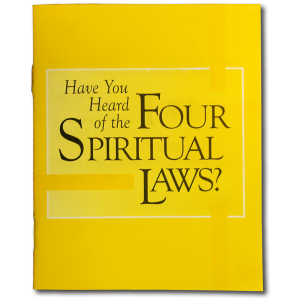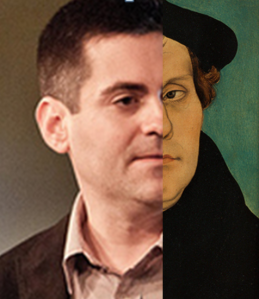Again, this piece is dedicated to those wonderful persons I met in Campus Crusade for Christ, many of whom, while not teaching Christ’s imputational grace and denying the presence of His deified flesh and blood in the bread and wine, nevertheless seemed to me to be compelled by His love. You woke me up to so many things I had missed.
Today we get much more personal: to what extent am I, as an individual, on God’s radar? And am I selfish for even asking that question?* One thing that American evangelicalism tends to emphasize is that an individual can have a personal relationship with God. Here in part II, we are also getting quite a bit more personal (this also gets more controversial, and deals with matters I brought up in the past here and here)
Again, some American Evangelical preachers highlight this very well: God really cares deeply for you personally. He actually wants to spend time with you! It’s not just Jesus – going to lonely places to pray – that the Father wants to hear from. Church should be like a date with God – it is something that can strengthen this love relationship you have with him. “OK…” many of us straight-laced Confessional Lutherans – ever concerned about proper reverence for God – say…
I heartily agree about reverence. But if this is your initial reaction, work with me here.
I just had a student who, talking about the interview she did for class with a practicing Christian, wrote this to me…. (names and places changed)
[My interviewee’s response] was about the most significant faith-based event in her life when her close friend John passed away in Iraq. She was very involved in her church at this time and taught Sunday school to 4 and 5 year olds. After [John] passed away in October she got upset and angry with God’s decision to take him away. In the spring time her mom came to her, asked to talk with her and they attended a church out in the country. (She is from Charleston.) Her mom pointed out that at the church a lady was wearing a pin with John’s face on it. Her mom began to speak with the lady and she turned out [to be] John’s aunt. The aunt said that she and her family just “felt the need to attend church that day.” So they got in the car and drove until they felt, “they needed to stop.” At this moment she knew that something was meant to bring all of them out in the country to this specific church on the out skirts of town. She knows that this situation was meant to bring them all together. She believes that John’s death helped them grow closer in friendship, family and in faith. After this they as a family continued to attend church together.
What should I have said in reply? (see ** for my reply below). Commented that maybe it was maybe not God who had arranged that but that it was perhaps just a coincidence?
Definitely not. There is every reason to think that God is even actively involved in far less significant events in our lives, all with the intent to draw us close to Him, the lover of our souls.
I remember when I was engaged and I got a letter from my lovely wife-to-be. I opened the letter from overseas with great, great eagerness. I so longed for that connection, to be engaged with her in that way – to hear from her and what she was doing… and yes, even to know that she had taken the time to write it to me! ***
Well, is it not similar with us and the Lord? With the Holy Church that God has won with His own blood? In one sense, we are already claimed – already His! And there is of course a deeper sense this is true that is still coming – that creates a longing like the one I mentioned above – we still await the wedding feast and the final consummation! Our status is very much like the way engagements were in biblical times – to be engaged was to have all the certainty of marriage already, even as the best was yet to come. There was no way, no how, the engagement could be broken off! You had been chosen! He had just broken into your life, made all the arrangements, and swept you away! And the result is this, as my dear pastor says, is that we are “Macgyver” Christians – everything we need we already have. ****
And here therefore, we can – we should! – long to be lost in the love of God. To be useful to Him, yes, but also to simply be with Him. Ecstasy.
“Whoa on that! Wait wait wait”…. we serious defenders of the biblical historical Christian faith say! But what of the cross? What of the Bible as the Word of God? Must not the cross and the written Scriptures get lost in such a message as one slips into mysticism? Is not the fact that God died for sins of the whole world – even you and your utterly wicked and abhorrent sins! – enough to give the person the sense that they are loved by God and valued by God? Why are you reaching for more? Why are you going where you ought not to go? Is not the fact that God has given us His written word enough for you?
My question is this: why are all these things necessarily opposed to one another?
After all, in Ephesians 1 and 3, it seems that the Apostle Paul speaks of a good mysticism:
“I keep asking that the God of our Lord Jesus Christ, the glorious Father, may give you the Spirit of wisdom and revelation, so that you may know him better. I pray that the eyes of your heart may be enlightened in order that you may know the hope to which he has called you, the riches of his glorious inheritance in his holy people, and his incomparably great power for us who believe… I pray that out of his glorious riches he may strengthen you with power through his Spirit in your inner being, so that Christ may dwell in your hearts through faith. And I pray that you, being rooted and established in love, may have power, together with all the Lord’s holy people, to grasp how wide and long and high and deep is the love of Christ, and to know this love that surpasses knowledge —that you may be filled to the measure of all the fullness of God. Now to him who is able to do immeasurably more than all we ask or imagine, according to his power that is at work within us…” (Eph. 1:17-19a, 3:16-20, NIV)
Amazing here Paul’s prayer for us! But Bible passages saying such things aside, the concern here is that personal experience – our feelings – will take over and starts to run the show. That is an extremely valid concern. People must stay grounded in the received Holy Scriptures first and foremost – and the cross born for their sins as God’s ultimate expression of love for them. You want to talk about experience? Our primary experience is in hearing – experiencing – the simple and humble Word of God spoken to God’s holy people – of which we are a valued one – about just these things.
Christ. Cross. Resurrection. Forgiveness. Life. Salvation. From. Sin. Death. Devil.
And Marriage (I mean Christ hooked up with the Church).
Remind me how this is boring?!
The impulse that many Confessional Lutherans have is to say that what we really need is to more deeply realize our depths of our sin and to more deeply realize the depths of God’s love in the Gospel. ***** I get this, and I think this is indeed the main key. But saying this, we are still left with questions like these:
- If I want to be better than what I am – to hurt those around me less and actually love them more and more – is that only my old man craving love and acceptance – and trying to earn my salvation before God?
- If I desire strongly for my “kids to turn out OK” does that mean I should necessarily conclude that I am only focused on myself (my own need for validation) rather than their good (as well as their neighbors whom they will affect?)
- Is it really always the old man and only the old man who wants to strive for holiness (yes, we know the Pharisees “strove for holiness” to, but is there any distinction to be made here at all?) attempting to “bring God down to earth”, to our level, ultimately insisting He submit to us and our self-righteousness? (i.e. we do not necessarily believe in justification by works theologically, but we, seemingly without any new man to speak of, must do so functionally)
- Again, is it only our old man, always seeking to justify himself, who wants to be urged on to do good works? ******
(If any of these questions seem a bit strange to even conceive of, stick with me here – it might help to know that in the 16th century some Lutheran Reformers, because of the battles they had been fighting, were actually tempted to say that good works were harmful to salvation).
And I think, intimately related to all of these questions, is it wrong for me – that old Adam again? – to somehow “want more of God”? (not from Him, of Him) Not necessarily to “get closer” to Him (i.e. feel like I am closer to Him) but to increase in knowledge of Him? To know Him more? To boast not in human wisdom or strength but that I know and understand Him?
Not at all.
Yes there is no way that we are going to make the wedding feast and consummation we long for come sooner. Nevertheless, wanting all of these things is good – very good! It is a good thing to know Him and His ways better! It is good to want to be used by Him at all times! It is good to realize that whatever one experiences – good or evil – suffering or elation – that “all things work for the good of those who love Him and are called according to His purpose”! It is good to want a deep “love for the lost” – all of whom Christ desires to save! It is good to believe that there is nothing too small to pray for, and that God is intimately involved in every detail of our lives (finding even our lost ax heads [Elisha]) – and desires to be more so daily! It is good to want to run the way of His commandments, “stand in the gap”, see Him working in all things, and desiring to “be His man”! (and we know he is there for “the world” – your “neighbors”!) It is good to want to be “all there” with Him at all places and all times! (again, in love towards the neighbor!) It is good to dream about being a soldier of God like Moses, Elijah, Mary, Peter, or Martin Luther – and to be open to God’s using you in this or that way if He so desires (and, importantly, to be able to be content if He does not)! It is good to say, as the Christian rock group Petra sung years ago: “I am available”! There is nothing wrong with any of that! God’s plan does include key persons – including some very key persons – who are prominent in working out His will (where he indeed had some kind of a “blueprint” for them from the beginning) ******* and we should never, ever – in the interest of promoting “sanctified common sense” (which we should) – think that it is pious to assert that “God has no plan for your life!” ********
I know. Many of you are likely bothered by all those exclamation points. I don’t usually use them. But I do so here to make my point as strongly as I can.
It is the pagan gods, not the Christian God, who refuse to be lovingly involved in our lives, much less every step of the way.

God also uses the fruits of evil – suffering and death – in our sanctification. As Lutheran pastor John Kleinig says, God makes you holy by taking things away from you! This culminate with our final breath.
Yes, this can be taken too far. Yes, abuses are rampant. Yes, there are those Christians who think that as one matures in the faith, they will suffer less not more. Yes, there is a niche market for pastors who are “vision-casting” leaders and will run over anybody and everybody who will not get with their (God’s!) program. Yes, many persons unthinkingly associate the feelings they get in a contemporary worship service with the presence of the Holy Spirit in their hearts. And yes, there are persons out there who are convinced that God told them to paint their kitchen table yellow or that whenever they feel good about some serendipitous thing that happened it is God but not if they don’t feel good about what happened. Rock-star Confessional Lutheran pastors like Jonathan Fisk and Brian Wolfmueller are quick to point out some of the more and less obvious abuses here and here, respectively (if you think the verse “I know the plans I have for you” from Jeremiah was written with your circumstances specifically in mind, give Pastor Wolfmueller’s great talk – the second link – a listen… there is a much bigger picture you do not want to miss).
Still, the abuses do not mean that God is not working in your life and that you should not have a robust confidence that he has, for example, arranged a special meeting with the aunt of your friend who was killed in Iraq at a church neither of you normally attend… or provided your family that new minivan you had been praying for, or helped you find the lost toy for your child…. or provided a potential spouse whom would be a good match for you…. or perhaps even miraculously prevented your cat from hanging himself. (yes, and this also means that God’s hand is in all things – even evil things that occur – but to know how “God really feels”, we do not try to interpret these events, but look to the cross).
The point here, of course, is that you just do not base your entire Christian life on these beliefs. You don’t, like many persons in the Church are perhaps wont to do, form doctrines and dogmas based on them. You don’t make a practice of laying out “fleeces” before the Lord or agonize about unanswered prayers. You don’t pitch God if that voice you listened to ends up misleading badly (“oh, I guess that was against what the Scriptures say”). No. Beliefs like those mentioned in the preceding paragraph, robust convictions though they may be, are nevertheless held relatively lightly. Instead, the things that matter most – and that never can be doubted – are rather kept before our eyes: salvation by grace through faith in Jesus Christ. This is the core message of the Scriptures.
So none of this is opposed to the cross and the written Word, even if yes, other experiences are always vying – and being used by the evil one – to override the humble and simple Word – and the humble and simple Sacraments (our real problem is not realizing just how immense and intimate – albeit quiet, simple and humble – something like the Lord’s Supper really is).
This we must unfailingly guard against. But we do not want to do so by dampering the right enthusiasm that Christians – actually compelled by His love (II Cor. 4:15) – have about living a life of communion with Christ and being found more deeply in Him and His will…. looking for growth to occur wherever God has placed them at that very moment (hopefully always being well grounded in the Scriptures). That would be another kind of enthusiasm that we should warn against.
In sum, my prayer is that all us might long for this upcoming consummation more and more:
“And we all, with unveiled face, beholding the glory of the Lord, are being transformed into the same image from one degree of glory to another. For this comes from the Lord who is the Spirit.” (II Cor. 3:18)
(for more of this kind of thing, see this post)
Feel condemned by all of this? Like you have been missing out on the fullness of God’s plan and desires for you? If so, let me say this, which is also the last thing I said in that blog conversation referenced in the footnotes below:
However many of God’s commandments we may have broken, however much we may have chosen paths that were not those He would have preferred, however many regrets we might have… those are to be left behind, as we go forward in both His pardon and power, which always avails for us in the blood. And let’s especially lift up the true body and blood of Jesus for us here, since that is what many, strangely, since the beginning of the Reformation have been keen to deny. But I submit a greater realization of such gifts is in fact our highest need.
And so we end as we began:

Again, Luther-loving pastor Tullian T. basically says that he does believe in “the third use of the law” – he just doesn’t want to have to qualify things all the time (from sermon on “Discipline, Demagogery, and Jesus”, by his fellow Coral Ridge pastor Steve Brown).
(or alternatively, watch this excellent 10 minute clip with Pastor Tchivijian – all of us need to be reminded of God’s love for us like this sometimes)
FIN
Notes:
* When I first wrote the following, I thought about naming it ‘Embracing Goals of the Gospel: Why Enthusiastic Christians Should Not Believe Enthusiasts who Insist God Has No Plan for Our Lives” (but that is some real inside baseball in my Christian Church, the Lutheran Church – Missouri Synod)
** “Thanks for sharing this kind of story. My take on things like this is that God uses all things for the good of those who love Him and are called according to His purpose. We do not put our hope in experiences like this – His simple and humble word should be enough! – or build our understandings of Him based on our experiences… but we see these things happening in the wider context of a biblical understanding of who God is and His providential care for His children….”
*** As love grow, such feelings certainly cool and change, but I still greatly look forward to seeing her after work each day.
**** Billy Graham’s grandson, Tullian Tchividjian: “The only way out of the slavery that accompanies a life of needing to take and get is for our hearts to be overwhelmed by what we already have. That’s the only way.” (Sermon, Dec. 7: “How to Be Perfect, Part 11”, available on iTunes)
***** Think you are really are not that bad? Listen to Tullian Tchividjian, mentioned in the previous footnote, reveal sin in his “practical” sermon series “How to be perfect”. Among other things, he says “The problem in the Church is not cheap grace. It is cheap law… if you really understood [your need] you would never say ‘Yes grace, but….’” (“How to Be Perfect, Part 7”, available on iTunes)
****** Others: “Is the Christian life more than feeling guilty about not feeling guilty enough so that one can really appreciate the Gospel and be transformed as one ought to be? In other words, if I cannot seem to feel guilty the way that I should, does that mean that I am cursed to never really begin to know the Gospel that compels true love?” and “As I mature in Christ, does this mean that my realization of my self and individual identity is in some sense completely lost?”
******* One traditional Lutheran pastor recently said to me: “I… think that the examples of Scripture where God provides specific direction to specific individuals are specific cases serving the specific purpose of the grand plan of our salvation in Christ. I do not think they form a general pattern of general applicability to be applied to everyone in general.”
This is worth thinking about more deeply. So what do the Scriptures say about how God guided some of the main figures in the Bible? They say, for example, that the Lord knew Jeremiah before He was born and had specific plan for him to be the Lord’s man, so to speak (Jer. 1:5). Earlier on, we read the same of Samuel, as we are told specifically what would be his purpose after Hannah prays for a child and has her prayer answered in spades! These persons, no doubt, were set apart at some point for a special purpose – even before their births.
Is it wrong to believe that someone like Luther was set apart for a special purpose – perhaps with an “ideal will” God meant for him to fulfill (we can think hard, for example, whether someone like Samson really fulfilled his mission in the way that God wanted him to – or if here, especially, God used evil for good)? Why should we assume that in the past, as God was leading His church, he had certain designs for certain persons, but that after we have the Holy Scriptures in their final form this no longer holds true? This does not necessarily mean that God ideally has such a purpose for each and every individual that lives on planet earth (though I am thinking hard about the man born blind now…), but I see no reason to think that God does not raise up specific men when the time is right.
These are all things the recent conversation I had at the BJS blog forced me to think about (most of this footnote was originally posted there). I realized I had always believed that God raised up Martin Luther in particular to do what he did – and gave him a supporting cast for “such a time as this”. Providence. God is guiding history and in control… If I recall, as regards the prophecy made by John Hus about the Swan that would arise (Luther!), many Lutherans believed it while Luther was still alive, and Luther himself no doubt knew about it. If they had the kind of attitude towards these things that many Confessional Lutherans, for example, seem to have towards more supernatural guidance given to personal individual and for personal individuals, it seems to me that they would not have even considered the prophecy and rather denounced it.
******** One traditional Lutheran pastor said to me: “If there is a blue print for our lives, and there isn’t because the Bible does not talk that way, it would be in God’s sovereign will and would thus be out of bounds for us anyway.”
I replied as follows:
In short, I don’t think we can know what you assert here. I do realize here that I might believe in something like a “blue print” for certain lives – an “ideal will” for persons God sets apart, so to speak. That said, for others, I think we could say that I at least believe in an “evolving blueprint” (which I’ll explain in a second). In any case, we agree on the meaning of “plan” in one sense: “keeping with his moral will/plan for me and to keep me in his salvific plan for me”. We disagree in another sense, where there can indeed be a more supernatural hand in individuals and even group’s lives. I believe, for instance, there that *at any point in time* there may be multiple plans, all morally good or acceptable: plan A, plan B, plan C, etc, with plan A being the best, for example (for a parallel with the Scriptures, we again point out how both marriage and celibacy are good, but celibacy, according to the Lord’s Apostle, is better). Further, plan A may only be able to be undertaken with prayer and fasting for example, and may require the belief that God has answered specific prayers in specific ways (again, I do think we can, but do not *need to*, pray about specific needs for ourselves or others, and have confidence that God has answered our prayers in specific ways – there are basic needs that kids have that they naturally ask their parents about – that seems to be what Jesus is talking about, when he talks about asking our Father for good gifts).
Again, just because these kinds of beliefs are abused does not mean that they are false. None of this has anything to do with receiving new revelations that are going to form and reveal and develop doctrine (enthusiasts, Rome leading the pack). Further, this [kind of activity] is not our main focus. The fact that I’ve had such a hard time figuring out how to put this makes that clear to me at least. I am more focused on talking about Jesus and the sweet peace and certainty that He brings us in His Gospel: forgiveness, life and salvation. In my classes, for example, this is what we are always talking about in a myriad of ways. [Rome’s and the teachings of others] are condemned by us because they add works, thereby rejecting these things and the certainty they bring the Christian.”
Image credits: Wikipedia ; Jesus and Church: “Like an apple tree… is my lover”, Julius Schnorr von Carolsfeld, 1851-1860, accessed at http://www.biblical-art.com/artwork.asp?id_artwork=725&showmode=Full, Fall 2012 ; John Kleinig: www.canadianlutheran.ca







![“[He] grew in wisdom and stature, and in favor with God and man”.](https://infanttheology.files.wordpress.com/2014/12/jesus_and_the_doctors_of_the_faith_dsc01783.jpg?w=300&h=211)








